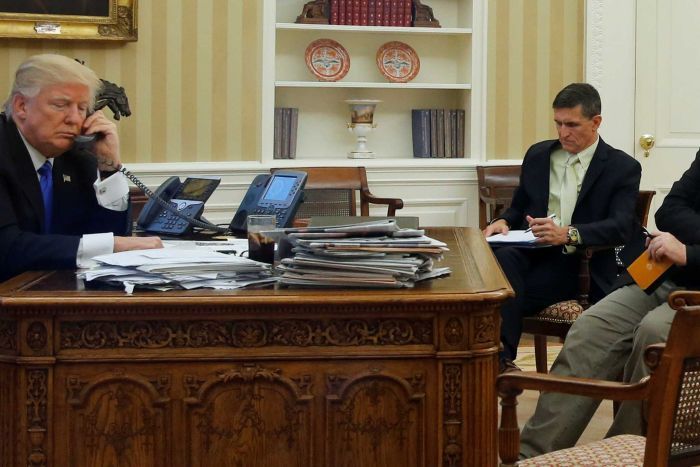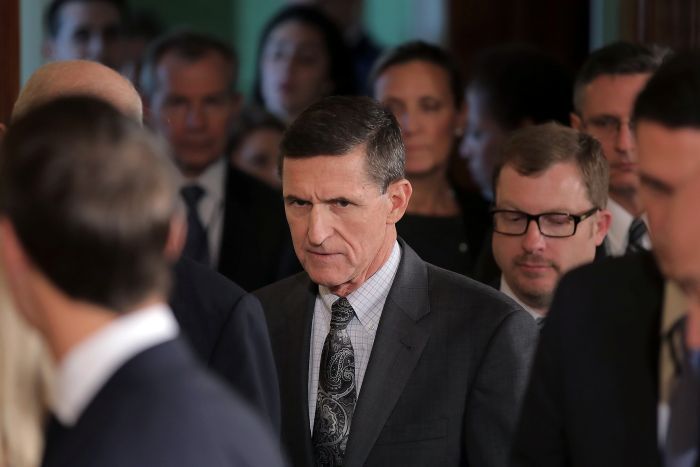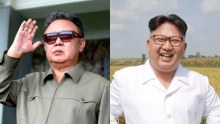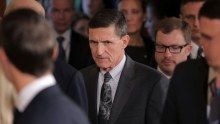Donald Trump's security adviser Michael Flynn resigns over contact with Russian official
Updated
Donald Trump's embattled national security adviser Michael Flynn has resigned after reports he misled administration officials about his contacts with Russia's ambassador to the US.
Key points:
- Mr Flynn had been under pressure over his contact with Russia's ambassador
- He said he gave "incomplete information" about those discussions to Mike Pence
- Retired Lieutenant General Keith Kellogg is named acting national security adviser
Mr Flynn's departure less than one month into the Trump administration marks an extraordinarily early shakeup in the US President's senior team of advisers.
In his resignation letter, Mr Flynn said he held numerous calls with the Russian ambassador during the transition and gave "incomplete information" about those discussions to Vice-President Mike Pence.
"In the course of my duties as the incoming national security adviser, I held numerous phone calls with foreign counterparts, ministers and ambassadors," Mr Flynn said in his resignation letter.
"These calls were to facilitate a smooth transition and begin to build the necessary relationships between the President, his advisers and foreign leaders.
"Such calls are standard practice in any transition of this magnitude.
"Unfortunately, because of the fast pace of events, I inadvertently briefed the Vice-President elect and others with incomplete information regarding my phone calls with the Russian ambassador.
"I have sincerely apologised to the President and the Vice-President, and they have accepted my apology."
Mr Pence, apparently relying on information from Mr Flynn, initially said the national security adviser had not discussed sanctions with the Russian envoy, though Mr Flynn later conceded the issue may have come up.
Mr Trump has named retired Lieutenant General Keith Kellogg as the acting national security adviser.
 Photo:
Mr Flynn had been under pressure to quit after reports he misled administration officials. (Reuters: Jonathan Ernst)
Photo:
Mr Flynn had been under pressure to quit after reports he misled administration officials. (Reuters: Jonathan Ernst)
Lieutenant General Kellogg had previously been appointed the National Security Council chief of staff, and advised Mr Trump on national security issues during the election campaign.
The Justice Department had warned the Trump administration weeks ago that contradictions between the public depictions and the actual details of the calls could leave Mr Flynn in a compromised position, according to the Associated Press.
Mr Flynn was a loyal supporter of Mr Trump throughout the election campaign, but his ties to Russia had caused concern among other senior aides.
Earlier, before Mr Flynn's resignation, White House spokesman Sean Spicer said Mr Trump was consulting with Mr Pence about his conversations with the national security adviser.
Asked whether the President had been aware that Mr Flynn might have discussed sanctions with the Russian envoy, Mr Spicer said: "No, absolutely not."
 Photo:
Mr Flynn's conversations with the ambassador reportedly occurred when the Obama administration slapped sanctions on Russia. (Reuters: Carlos Barria)
Photo:
Mr Flynn's conversations with the ambassador reportedly occurred when the Obama administration slapped sanctions on Russia. (Reuters: Carlos Barria)
Mr Trump, who comments on a steady stream of issues on his Twitter feed, has been conspicuously silent about the matter since The Washington Post reported last week that Mr Flynn had discussed sanctions with the Russian envoy.
A US official told the Associated Press that Mr Flynn was in frequent contact with ambassador Sergey Kislyak on the day the Obama administration slapped sanctions on Russia for election-related hacking, as well as at other times during the transition.
Mr Flynn's discussions with the Russian raised questions about whether he offered assurances about the incoming administration's new approach.
Such conversations would breach diplomatic protocol and possibly violate the Logan Act, a law aimed at keeping citizens from conducting diplomacy.
Russians claim Flynn's resignation shows 'Russophobia'
Senior Russian politicians said Mr Flynn's resignation showed that efforts were being made to undermine Russian-US relations.
"It's obvious that Flynn was forced to write the letter of resignation under a certain amount of pressure," Leonid Slutsky, head of the Lower House of Parliament's foreign affairs committee, was quoted as saying by the RIA news agency.
"The target was Russia-US relations, undermining confidence in the new US administration."
Fellow MP Konstantin Kosachev, who leads the Upper House of Parliament's international affairs committee, said the resignation could be a sign of growing anti-Russian feeling in the White House.
"Either Trump has not gained the requisite independence and he is gradually being [not unsuccessfully] backed into a corner, or Russophobia has already infected the new administration also from top to bottom," Mr Kosachev said on social media.
The Kremlin has denied that Mr Flynn discussed lifting sanctions with the Russian envoy and declined further comment, saying the resignation was an internal matter for the United States.
"We've said everything we want to say," spokesman Dmitry Peskov said.
US-Russia relations deteriorated to their worst level since the Cold War under the Obama administration, which slapped economic sanctions on Russia for its annexation of Crimea in 2014 and its involvement in Ukraine's separatist conflict.
ABC/AP
Topics: world-politics, government-and-politics, donald-trump, united-states
First posted








